
介绍:
There is so much about this year's Golden Globe winner "12 Years a Slave" that shows why it deserves universal acclaim.
First and foremost, it is in itself a fairly good movie to begin with.
Story-wise, it is based on, and strictly faithful to, Solomon Northup's 1853 memoir of the same name. The book offers an account of 19th century America's slavery system, from the perspective of a free Negro sold to slavery. Unlike Quentin Tarantino, in his 2012 film "Django", director Steve McQueen doesn't take the subject for granted and instead allows the viewers to learn about the dark side of American history from a freshman's point of view; much like Solomon himself in the story.
Next, Steve McQueen's determination to uncover the sinister past from under the carpet is given strong support from the cast. Lead actor Chiweltel Ejiofor may have lost out on a Golden Globe this week to Matthew McConaughey for his role in Dallas Buyers Club, but he does convey a memorable image of a freeman being forced to slavery. During the two hours, we follow him around on the big screen, fear his fears and dream his worst dreams. Some of these fears and dreams are delivered in person by none other than Michael Fassbender as the slave owner Edwin Epps. He's tried his best, though he isn't good enough to compete with the most dedicated actress Lupita Nyong'o. The latter's character of a young female slave seems to carry upon herself all the burdens of an inhumane system.
And of course the skills of the cast are amplified by the powerful imagery captured by cinematographer Sean Bobbitt. It is a pretty lengthy movie that runs for more than two hours, but I don't think anyone would be able to forget one particular scene half way into the film, where Solomon is hung against a tree. That long take alone contained enough fear and cruelty, so much so that it at least partly explains why slavery existed in the southern part of the United States for so long, and why it was abolished eventually.
One more explanation for the movie's success is perhaps the fact that few people are willing to question McQueen's work, because those who actually do so would need a lot of courage. However, black Canadian author Orville Lloyd Douglas is one of the very few courageous critics. And here I quote what he said from the Guardian: "I'm convinced these black race films are created for a white, liberal film audience to engender white guilt and make them feel bad about themselves. Regardless of your race, these films are unlikely to teach you anything you don't already know."
Well, nothing is really new under the sun. Even if it doesn't teach us anything fresh, the feelings and inspirations from watching such a great film are good enough.
大家还在听

